
Real-world learning
Hands-on experience from day one with real employers, solving real problems

A three-year engineering degree, combining undergraduate and postgraduate study - available with an optional Foundation Year
Become a work-ready, world-conscious engineer with this unique accelerated MEng Integrated Engineering degree which combines undergraduate and postgraduate study to get you work-ready, fast!
Stand out from the crowd in the employment market and speed up your learning by one year on this accelerated programme. Develop the skills and tools you need to succeed in your career within our ever-changing world.
Modelled on some of the best engineering universities in the world, our degree has been developed with leading engineers from industry and created in collaboration with students.
Benefit from real-world project briefs in every module and visiting industry professionals. Over 80 partners span local, national and global organisations including JCB, Balfour Beatty, Schaeffler, Wye Valley NHS Trust, Octopus Energy and Welsh Water.
You'll discover the why, what and how of engineering, whilst harnessing and perfecting the practical skills needed to make your impact.
Tried, tested and delivered in the context of real-world challenges, you'll gain hands-on experience to succeed as an engineer, all whilst developing the specialist and multi-faceted knowledge required to take on, and help solve, the problems that matter to you and the wider world.
An MEng degree provides the most direct way of meeting the educational requirements for successive registration as a Chartered Engineer, and graduates typically command higher starting salaries than those with the equivalent BEng.
The option of a Foundation Year is available for those who do not meet the entry requirements for this technical degree but who are passionate about becoming a future engineer.
Meet Sukhpreet, an NMITE MEng (Hons) Integrated Engineering student. He chose NMITE because we’re new and different, which set us apart from the rest. He shares his sense that he belongs to a pioneering educational community.

Hands-on experience from day one with real employers, solving real problems

Instead, benefit from your personal learning portfolio that will live on for life

Make the most of lots of academic contact time, with evenings and weekends free

Achieve an MEng degree in just three years - faster and at lower cost

Inclusive of all the hardware, software and IT support you need for your studies
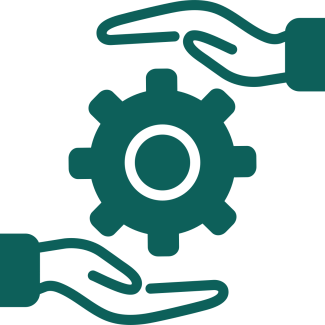
Learn in small student teams - no traditional lecture theatres in sight
As an NMITE student you’ll work on real-world problems; problems that require sustainable solutions. You’ll strategise. You’ll deliver. You’ll develop the skills you need to preserve our precious planet. Sustainability is woven through every fibre of our engineering and technology construction degrees.
Prepare for your career. Choose an NMITE degree, designed in collaboration with industry partners, with real-world projects in every module and visiting industry professionals. Our students collaborate with local, national and global brands across different sectors including JCB, Balfour Beatty, Schaeffler, Wye Valley NHS Trust, Octopus Energy and Welsh Water.
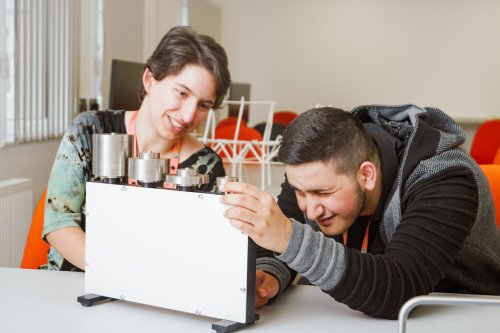
Discover what you need to know about this degree.
Develop your engineering abilities and enhance your employability. Accelerate your learning by one year on this MEng degree, graduating in just three years (or four years with an optional Foundation Year).
At NMITE, we boost your employability through immersive, employer-engaged learning, developing your expertise, contextual understanding, work experience, employability skills and perspective.
We prepare you for the engineering industry, which desperately needs graduates with subject knowledge and excellent problem-solving skills, with the ability to apply these skills to real-world environments.
The MEng degree provides the opportunity for you to develop your engineering and leadership skills further than the BEng degree, helping you to stand out from the crowd when you graduate.
The accelerated pathway will speed up your learning, placing you one year ahead of your peers.
Your degree
The industry focus of this degree is distinctive because we integrate commercial partners into every stage of your learning. Our unique model of working on real-world challenges brings you into contact with employers of varying sizes and from a multitude of sectors including security, health, energy, sustainability, food production and infrastructure, working on projects that enhance their business.
Your learning will take place in partnership with industry, guaranteeing that it’s not only up to date, but reflects a real engineering environment. Your interaction with many partners will allow you to build an extensive network and demonstrate your engineering ability to a wide range of future employers.
Your career
This degree will equip you with the expertise and experience to make a real impact in a broad range of engineering sectors, including energy, utilities, defence, transport, manufacturing, consulting and SMEs.
As a graduate, you’ll demonstrate the outcomes required by the Engineering Council's latest accreditation framework. This means you can apply for CEng (Chartered Engineering status when you graduate, boosting your employability.
Graduates will be prepared for a range of roles, including quality/compliance engineer, design/R&D engineer, technology consulting engineer, and manufacturing/automation engineer. Graduating with a MEng (Hons) in Integrated Engineering can also allow you to progress onto further study, such as a specialised MSc or PhD.
An MEng degree provides the most direct way of meeting the educational requirements for successive registration as a Chartered Engineer (subject to accreditation), and graduates typically command higher starting salaries than those with the equivalent BEng.
Did you know?
The average salary for a graduate engineer in the UK is pretty impressive, currently sitting at £34,128 per year (Glassdoor, 2023). MEng graduates typically command higher salaries than BEng graduates.
We welcome applications from students from all backgrounds.
MEng (Hons) Integrated Engineering
MEng (Hons) Integrated Engineering with Foundation Year
Current IELTS requirement for students whose first language is not English:
Discover more about our admissions process via the link below.
Optional Foundation Year
If you didn’t get the A-level results you were hoping for, are thinking of a change in career, or if you did not follow traditional routes into higher education, then starting your studies with a foundation year may be the right choice for you. You'll develop the key transferable skills and subject-specific knowledge needed to continue into the full BEng degree.
Level 4
You'll be introduced to the fundamentals of engineering through challenge-based learning, beginning your journey with an orientation into the engineering profession and practice. You'll work in teams to analyse standard problems in a multi - and interdisciplinary way. You'll undertake focused activities to evaluate, interpret and present data in a clear and compelling way.
Throughout the year you'll develop independent learning and team-building skills, with an emphasis on project management and communication (including rhetoric, effective writing, and deep and critical reading). Industry-focused communication assessment methods are included in those modules that have been created to instigate the development of the behavioural practices of an industry-ready graduate (the future you!)
Level 5
During this year you’ll develop more extensive knowledge and understanding of the core areas of engineering with, where appropriate, support in mathematics and sciences (we'll get you up to speed with exactly what you need to know).
You'll begin Level 5 with a synoptic challenge that provides an opportunity to understand engineering in a social/community context, and to draw across all engineering learning from Level 4 to create value in that context.
Level 6
By the end of Level 6 you can expect to be self-motivated, efficient and organised in independent learning. Level 6 begins with a closer examination of formal project management approaches (People and Projects in Engineering), moves through two integrative engineering projects (Data-driven Engineering and Manufacturing as Integrated Engineering) before concluding with an individual project.
Assessment methods at this stage are designed to include a combination of both academic and industrially focused formats. Focus will be given to assessing the development and attainment of the knowledge and understanding necessary to apply technology to engineering problems and processes, and to maintain and manage current technology (essentially we teach you the what, why and how!)
Finally, you'll be required to undertake an individual Bachelor’s Engineering Project where you'll develop technical and professional skills.
Level 7
Level 7 consists of two modules that have been designed to extend your integrated engineering outlook to full lifecycle concerns (Lifecycle Performance of Engineering Infrastructure), and develop key mindsets of Research and Modelling.
Following this, you'll undertake an individual Master’s Engineering Project. You'll develop enhanced technical and professional skills, and specialist knowledge. You'll also be required to record and reflect on your accumulating experiences for later use in professional recognition.
Assessments at Level 7 are designed to assess engineering capability and industry readiness, and therefore adopt mechanisms which assess ability in application (learn it, apply it!)
Assessment methods include a combination of both academic and industrially focused formats. Including academic reports such as literature reviews, laboratory and experimental write-ups and project reports. Industry relevant assessment includes formats such as industry-based test report, design review presentation, and technical communication. Assessments provide a demonstration of the greater range and depth of specialist knowledge at Level 7, within a research and industrial environment, as well as a broader and more general academic base.
The foundation for leadership and a wider appreciation of the economic, legal, social, ethical, and environmental context of engineering are also included - setting you up for success following graduation.
Learning timetable
Learning takes place within the hours of 9-5, Monday-Friday - modelling the real workplace. Your own time is just that, undisturbed for you to enjoy.
Academic calendar
As an accelerated student you'll have a shorter summer break than traditional degree students. View term dates via the link below.
We’re a growing revolution and UK breakthrough in university education. Our degrees have been purposefully designed, from conception to creation, to be different. The difference? Preparing you to be confident, skilled, world-conscious, and outstandingly employable.
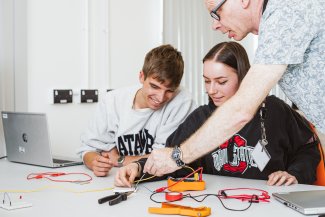
The course is taught one module (30 credits) at a time, with each module taught in an 8-week block. An academic year comprises four modules, with each module taking eight weeks to complete. Students on this four-year degree will take four modules over an academic year (120 credits and 32 taught weeks per year).
We’re dedicated to easing the financial burden for our students through our bursaries and scholarships that don't have to be paid back. Check out what’s on offer to support your NMITE journey.

Meet us first-hand at an NMITE Open Day and experience The NMITE Difference for yourself. Meet students and staff, explore our campuses and check-out our accommodation too!

Discover what you need to know about student support, fees and finances, and other handy topics below.
You’ll be supported fully throughout your time with us (and beyond as you become an NMITE Alumni). Discover our network of student support and wellbeing services via the link below.
Tuition fees (2026/27 and 2027/28 entry)
UK students
Tuition fees for AY26/27 - £11,430 per year
Tuition fees for AY27/28 - £11,735 per year
International students
£18,000 per year
Please visit our student finance page for information on tuition fees and student loans, as well as non-repayable grants, bursaries and scholarships, eligible to different groups, to support with study costs.
NMITE bursaries
We know that going to university is a financial commitment. That is why we are dedicated to easing the financial burden for our students through our bursaries and scholarships. We have several financial awards available for future and existing students.
Our student accommodation provides luxury halls of residence in the heart of Hereford city, a stone’s throw from our campuses. Offering an all-inclusive experience, rooms are fully furnished, ensuite and cleaned weekly. Connect instantly with new friends, joining a ready-made family of like-minded budding student engineers.
Oh, and accommodation is guaranteed for all first-year students.
If you've been searching for an education that can provide you with the industry experience you need to make a difference - you've come to the right place. Real-world problems. Real employers. Real hands-on degrees. Start NMITE journey today.
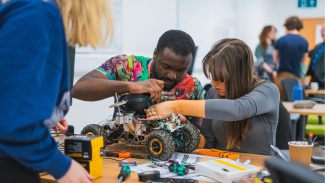
Make the most of two specialist campuses, equipped with interactive learning studios, ergonomically designed to support teamwork and boost communication. Enjoy industry standard workshops, with cutting-edge technologies – all designed with the environment in mind.
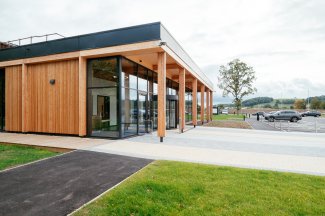
Choose from our integrated engineering and sustainable built environment degrees. Make the most of opportunities to study a foundation year and accelerate your degree.

Build the future as a modern construction professional on our three-year BSc Sustainable Built Environment degree.
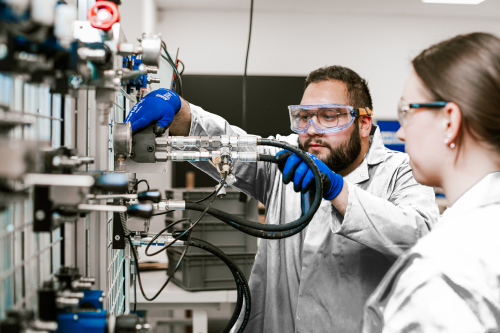
Experience hands-on learning and prepare to create an impact on our three-year BEng Integrated Engineering degree.
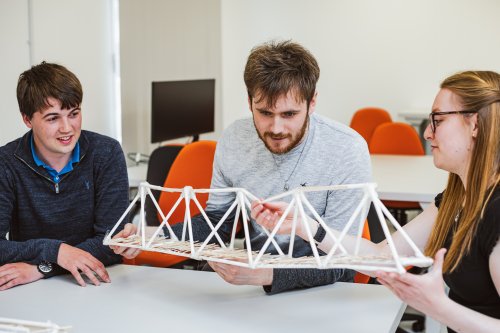
Make the most of a one-year programme, designed to help you develop the expertise you need to progress onto your chosen NMITE degree.